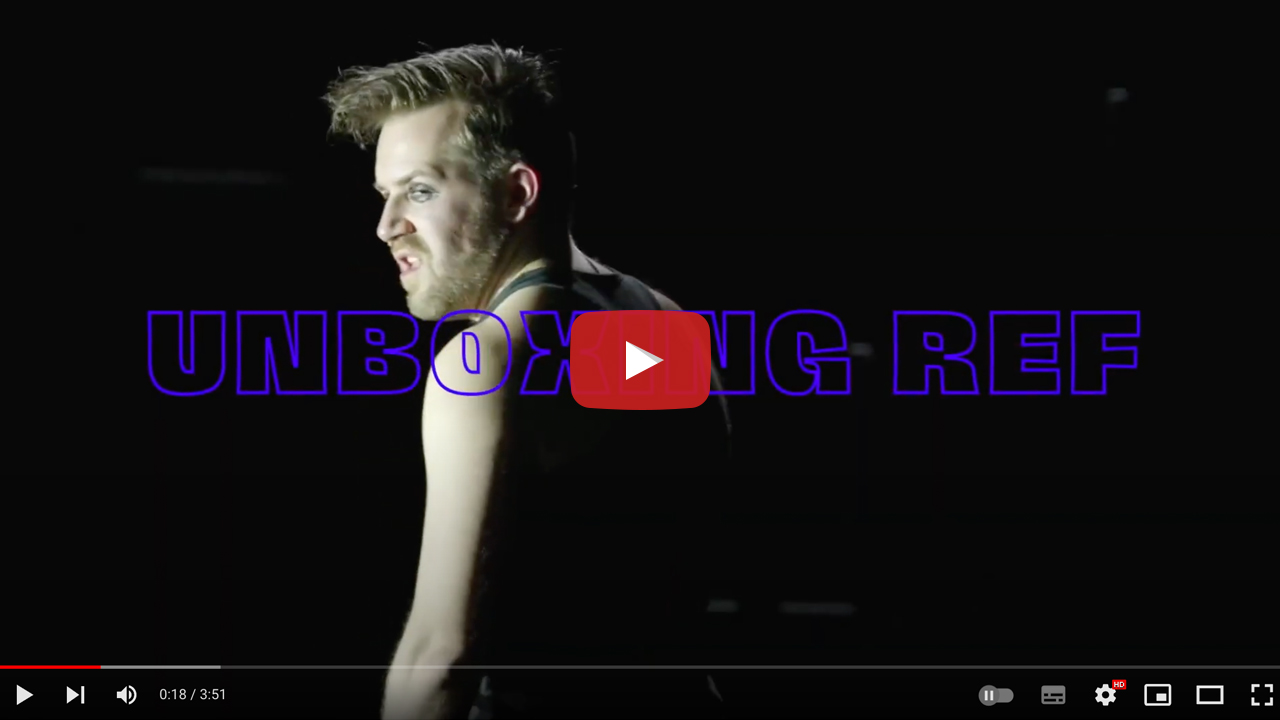ITA/ ENG
LŌĆÖOPERA DA TRE SOLDI di BERLINER ENSEMBLE / BARRIE KOSKY
├ł ora di aprire un altro dono.
Unboxing REF ├© un momento dedicato alla scoperta, alla condivisione, allŌĆÖaprirsi delle voci delle artiste e degli artisti di questa edizione del festival per svelare alcuni dettagli delle loro creazioni e condividerle.
Il protagonista di questa settimana ├© Barrie Kosky, direttore artistico della Komische Oper Berlin fino al 2022 e qui artista residente ancora per altre cinque stagioni e tra i registi dŌĆÖopera pi├╣ importanti e acclamati al mondo. Insieme ad una compagnia altrettanto iconica come quella del Berliner Ensemble ha riallestito la celebre Opera da tre soldi (Die Dreigroschenoper) tra i monumenti teatrali del ventesimo secolo.
┬½Questa produzione ├© nata qualche anno fa nello stesso teatro in cui debutt├▓ lo spettacolo per la prima volta cambiando la storia del teatro musicale┬╗ ci racconta Barrie Kosky. ┬½Distaccandoci dalle consuete messe in scena, siamo fuggiti da qualsiasi clich├® legato alla Repubblica di Weimar o al suo cabaret. Abbiamo cercato di dare vita a unŌĆÖOpera da tre soldi che avesse senso nel mondo di oggi, sia musicalmente che scenicamente┬╗.
Die Dreigroschenoper ├© l’opera pi├╣ famosa e pi├╣ rappresentata di Bertolt Brecht che aveva solo 30 anni quando la concep├¼ (Kurt Weill ne aveva 28). LŌĆÖazione ├© ambientata nel contesto della malavita londinese. Viene messo in scena un violento attacco socialista alla societ├Ā capitalista, ritratta come una banda di delinquenti. Nell’Inghilterra vittoriana si racconta di un protagonista criminale, Mackie Messer, dei suoi problemi e delle sue vicende. Il suo antagonista Peachum ha un negozio dove affitta abiti ai mendicanti di Londra. Quando Mackie Messer sposa sua figlia, Peachum tenta di farlo arrestare e impiccare. Nel corso di questa satira socio-politica (con relativa parodia del melodramma italiano),lŌĆÖopera ricerca un effetto che Brecht chiama di┬Āstraniamento, contrapposto all’immedesimazione che al suo tempo era lo standard dominante nella messinscena. Ma una operazione cos├¼ rivoluzionaria non sarebbe stata possibile senza lo straordinario contributo musicale di Weill. Basti pensare che il pezzo di apertura e chiusura, Die Moritat von Mackie Messer, la pi├╣ famosa dell’intera opera, ├© diventata uno standard, non solo in ambito jazz vantando innumerevoli interpretazioni. Dopo┬ĀBobby Darin, vi si sono cimentati negli anni┬ĀLouis Armstrong,┬ĀElla Fitzgerald,┬ĀFrank Sinatra, Sting,┬ĀMilva,┬Ā Domenico Modugno,┬ĀMilly,┬ĀMassimo Ranieri e moltissimi altri.
E sono proprio le musiche di Kurt Weill, viatico per la dimensione pi├╣ emotiva dellŌĆÖopera, a nutrire la messa in scena di Barrie Kosky. ┬½Quello che Weill fa nella pi├©ce ├© contraddire apertamente ci├▓ che Brecht fa nel testo. Che cosŌĆÖ├© allora lŌĆÖOpera da tre soldi? UnŌĆÖoperetta? O come disse lo stesso Weill una ŌĆ£farsa con musicaŌĆØ? Cabaret? Uno spettacolo attraverso il quale, come desiderava Brecht, il pubblico doveva imparare qualcosa? ├ł tutto ci├▓! E ci├▓ che mi interessa ├© presentarlo al pubblico del ventunesimo secolo┬╗.
Su un palcoscenico spoglio, abitato da unŌĆÖimpalcatura gigante sulla quale si arrampicano e muovono gli attori, il regista costruisce uno spettacolo dalla forma divertente, elegante, estremamente coinvolgente e lascia emergere una storia contemporanea di violenza e dŌĆÖamore. Ne sono protagonisti gli straordinari interpreti del Berliner Ensemble (Nico Holonics, Cynthia Micas, Tilo Nest, Constanze Becker, Kathrin Wehlisch, Laura Balzer, Bettina Hoppe, Josefin Platt, Julia Berger, Julie Wolff, Dennis Jankowiak, Tobias Bieri, Teresa Scherhag, Katharina Beatrice Hierl, Nico Went, Nicky Wuchinger, Denis Riffel, Timo Stacey e Heidrun Schug), la compagnia fondata da Brecht che diede il nome al teatro prima conosciuto come Shiffbauerdamm e oggi tra i pi├╣ rinomati della Germania e del mondo. ┬½Ci sono alcune combinazioni di autori e compositori che sono speciali e hanno lavorato su un piano di parit├Ā: Hofmannsthal e Richard Strauss, Mozart e Da Ponte e Weill e Brecht. Nel caso dellŌĆÖOpera da tre soldi, tuttavia, ne sono stati coinvolti ancora di pi├╣: John Gay, da cui ha origine lŌĆÖopera, Elisabeth Hauptman che la tradusse, Fran├¦ois Villon, alle cui ballate Brecht si ispirava e cos├¼ via. Sappiamo molto del caotico periodo delle prove (ŌĆ”) ma ci├▓ che rimarr├Ā sempre un segreto sono le due settimane in cui Brecht e Weill si sono ritirati nel sud della Francia per concentrarsi sul loro lavoro. (ŌĆ”) Per me Weill, insieme a Sch├Čnberg e Stravinsky ├© uno dei cinque grandi compositori del ventesimo secolo. Era una persona molto riservata e mor├¼ dŌĆÖinfarto troppo presto, allŌĆÖet├Ā di cinquantŌĆÖanni. Lotte Lenya, sua moglie, ha affermato che mor├¼ di nostalgia di casa in esilio a New York. Di crepacuore si potrebbe dire. Sebbene abbia avuto molto successo in America, ha sempre avuto nostalgia di casa, della Germania, della sua cultura. Ed ├© molto triste, perch├® nessuno in Germania discusse seriamente di ci├▓ che aveva realizzato a Broadway. ├ł come se fosse stato semplicemente cancellato come artista. Ma ci├▓ che aveva realizzato in America era tanto radicale quanto ci├▓ che aveva iniziato a fare in Germania┬╗ afferma ancora Barrie Kosky nella brochure realizzata per il debutto dello spettacolo. ┬½Spesso dimentichiamo che questa pi├©ce ├© molto divertente e che pu├▓ essere molto emozionante, al di l├Ā di quanto Brecht pensasse delle emozioni in teatro. La musica e le canzoni di Kurt Weill la rendono emozionante┬╗.
UNA SPECIE DI AGENDA
O di appuntamenti, ascolti, visioni e altri immaginari estivi
Questa settimana vi segnaliamo Fuori Programma, il festival internazionale di danza en plein air, che prosegue la prossima settimana al Parco Tor Tre Teste Alessandrino con il coreografo israeliano Sharon Fridman e il suo 147 ABRAZOS + HASTA DONDE┬Ā(28 e 29 giugno) e con┬Ā i lavori LOOSE DOGS e GENTE #ROMA di Balletto Civile┬Ā(1 e 2 luglio), per poi spostarsi con negli spazi del Teatro India fino allŌĆÖ8 luglio, con un ricco programma di spettacoli, laboratori e progetti speciali.
ENG
It’s time to open another gift.
Unboxing REF is a moment dedicated to discovering, sharing, opening up the voices of the artists of this edition of the festival to reveal and share some details of their creations.
The protagonist of this week is Barrie Kosky, artistic director of the Komische Oper Berlin until 2022 (and resident artist here for another five seasons) and one of the most important and acclaimed opera directors in the world. Together with an iconic company as the Berliner Ensemble, he has created a new version of the famous Threepenny Opera (Die Dreigroschenoper) among the theatrical monuments of the twentieth century.
┬Ā“This production was born a few years ago in the same theater where the show was performed for the first time, changing the history of musical theater,” says Barrie Kosky. ┬½We have escaped from any clich├® linked to the Weimar Republic or its cabaret. We tried to give life to a Threepenny Opera that made sense in today’s world, both musically and scenically “.
Die Dreigroschenoper is the most famous and most represented work by Bertolt Brecht. He was┬Ā only 30 when conceived it (Kurt Weill was 28). The action is set in the context of the London underworld. A violent socialist attack on capitalist society is staged, portrayed as a gang of thugs. The story is setted in the Victorian England and told about a criminal protagonist, Mackie Messer, with his problems and his affairs. His antagonist Peachum has a shop where he rents clothes to London beggars. When Mackie Messer marries his daughter, Peachum attempts to have him arrested and hanged. During this socio-political satire (with relative parody of Italian melodrama), the work seeks an effect that Brecht calls ŌĆ£estrangementŌĆØ in opposition to the ŌĆ£identificationŌĆØ that at his time was the dominant standard in theater. But such a revolutionary operation would not have been possible without Weill’s extraordinary musical contribution. Suffice it to say that the opening and closing piece, Die Moritat von Mackie Messer, the most famous of the entire opera, has become a standard boasting countless interpretations not only in jazz,. After Bobby Darin, Louis Armstrong, Ella Fitzgerald, Frank Sinatra, Sting, Milva, Domenico Modugno, Milly, Massimo Ranieri and many others have tried their hand over the years.
And it is precisely the music of Kurt Weill, viaticum for the more emotional dimension of the work, that feeds Barrie Kosky’s staging. ┬½What Weill does in the play is openly contradict what Brecht does in the text. So, what is the Threepenny Opera? An operetta? Or as Weill himself said a “farce with music”? Cabaret? A show through which, as Brecht desired, the audience had to learn something? ItŌĆÖs all! And what interests me is to present it to the public of the twenty-first century┬╗.
On a bare stage, inhabited by a giant scaffolding on which the actors climb and move, the director builds a show with a fun, elegant, extremely engaging form and lets a contemporary story of violence and love emerge. The protagonists are the extraordinary interpreters of the Berliner Ensemble (Nico Holonics, Cynthia Micas, Tilo Nest, Constanze Becker, Kathrin Wehlisch, Laura Balzer, Bettina Hoppe, Josefin Platt, Julia Berger, Julie Wolff, Dennis Jankowiak, Tobias Bieri, Teresa Scherhag, Katharina Beatrice Hierl, Nico Went, Nicky Wuchinger, Denis Riffel, Timo Stacey and Heidrun Schug), the company founded by Brecht who gave the name to the theater formerly known as Shiffbauerdamm and today among the most renowned in Germany and the world. ┬½There are some combinations of authors and composers that are special and have worked on an equal footing: Hofmannsthal and Richard Strauss, Mozart and Da Ponte and Weill and Brecht. In the case of the Threepenny Opera, however, even more were involved: John Gay, from which the opera originated, Elisabeth Hauptman who translated it, Fran├¦ois Villon, whose ballads Brecht was inspired by and so on. We know a lot about the chaotic rehearsal period (ŌĆ”) but what will always remain a secret are the two weeks Brecht and Weill retired to the south of France to focus on their work. (ŌĆ”) For me Weill, along with Sch├Čnberg and Stravinsky is one of the five great composers of the twentieth century. He was a very private person and died of a heart attack too soon, at the age of fifty. Lotte Lenya, his wife, claimed that he died of homesickness in exile in New York. One could say of heartbreak. Although he has been very successful in America, he has always been homesick, for Germany, for his culture. And it’s very sad, because no one in Germany seriously discussed what he had accomplished on Broadway. It’s like he’s just been canceled as an artist. But what he created in America was as radical as what he had started to do in Germany┬╗ says Barrie Kosky in the interview realized for the brochure created for the show’s debut. ┬½We often forget that this play is fun and that it can be very emotional, beyond what Brecht thought of emotions in the theater. Kurt Weill’s music and songs make it exciting┬╗.

















